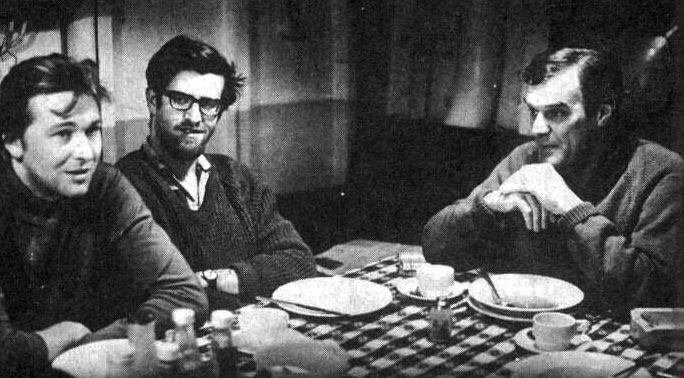 RADIO LONDON RADIO LONDON
HW WITH BIG L
A terrible wind was blowing and one of the sailors was lying in his bunk, green with seasickness.
"It certainly is gale force 8," according to the captain of the eggcup-sized boat transferring Hitweek from IJmuiden to Radio London.
Eighteen long hours on a small vessel (an ancient fishing boat), pitching and rolling so fiercely that the galley was transformed into chaos – jars of mustard on the floor, pans with potato-peels scattered around, broken plates and dishes.
A horrible gust of wind tore down the mast (no, dear Hitweek-readers, we do not exaggerate) and destroyed the radio-aerial, putting the radio out of order.
It was our first sea voyage, which made us completely sick to our stomachs. No, we didn't throw up, but we were relieved when Tony Windsor (Tea Double You) helped us aboard the old American minesweeper that floated remarkably more calmly on the North Sea waves.
Above: 'Phil' Lennox, Ed Stewart and TW in the mess.
Of all the pirates, Radio London obviously offers the best pop programmes. This becomes yet more evident as the others are copying Big L more and more.
Because Hitweek is increasingly getting sick and tired of the Radio Veronica programmes (leaving aside some exceptions) we decided to call on the deejays of 'London', especially to get to know a bit more about the faces behind the voices we hear day after day back home.
Tony Windsor (shown below, seated at the head of the mess table with John Edward and Mitch) is the senior disc jockey on board the Galaxy. We estimate his age being 38 years or thereabouts. He is from Australia, where he used to be very famous. Each week his programme was broadcast on more than 70 stations.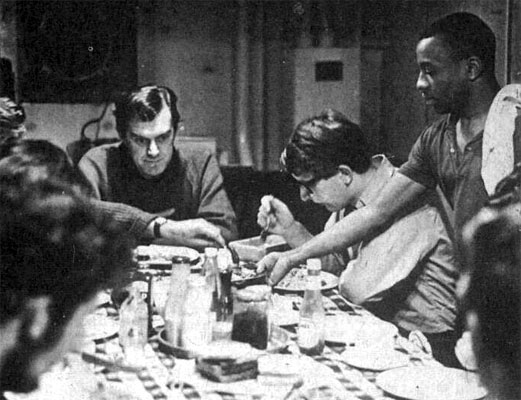
Tony is not the only deejay who knows all the ins and outs of the (commercial) radio trade.
Duncan Johnson, Phil [Mike] Lennox and Dave Cash are from Canada. There, for a considerable period of time, they have worked for commercial radio stations like Big L. Earl Richmond has been a DJ in Kenya and Cyprus. Ed Stewart has built his experience in Hong Kong and Ben Toney, the boss, is from Texas.
The Radio London format was, in fact, born in Texas, where there are plenty of commercial stations that specialise in a specific musical genre - such as country & western, R & B, rock & roll, sweet music and folk.
The Radio London vessel is originally from the US Navy. After the founders bought this old minesweeper secondhand, they had RCA install a powerful (50 kilowatt) transmitter and enthusiastically sailed towards the English coast.
Of course there are also English deejays on board. Mark Roman (24), Dave Dennis (28) and John Edward (21) submitted a demo tape of their broadcasting capabilities to the head office in London and were promptly hired.
The disc jockeys live on board the Galaxy for two weeks. Then they are off duty for one week. During that week they usually compere at the Radio London Discotheque.
Hitweek is shown around the whole ship (after a few cups of extremely strong coffee following the horrendous trip on the tender).
The furnishings leave a lot to be desired. There are improvised cabins (at first the crew were sleeping in hammocks), showers, a cosy (so to speak) social room with a television set where the meals are also served, the erm... studio - and that's about it.
There is little to do to while away the time on the ship. You can sense that most of the DJs consider their two weeks on board too long a time. Every deejay has a daily show lasting two hours. Then they have nothing to do. They listlessly watch all the programmes on television.
BIG L GOING DOWNHILL?
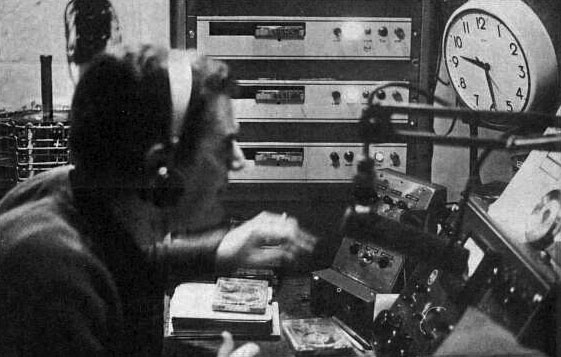 Hitweek mentions that Dutch insiders think that the quality of the Big L programmes is diminishing, lately. According to Paul Kay (a bearded Russian, who is responsible for the news and who also took the pictures on this page for us) this is due to the music in the charts in recent months. The quality of record releases is on the decline. The compilation of the Fabulous Forty is based upon the recent releases that the DJs consider hit-bound. If the records disappoint... well, there you have it. Hitweek mentions that Dutch insiders think that the quality of the Big L programmes is diminishing, lately. According to Paul Kay (a bearded Russian, who is responsible for the news and who also took the pictures on this page for us) this is due to the music in the charts in recent months. The quality of record releases is on the decline. The compilation of the Fabulous Forty is based upon the recent releases that the DJs consider hit-bound. If the records disappoint... well, there you have it.
Hitweek had nice talks about pop music in general and so forth, but that is something we may share in the future.
What we are most interested in, of course, is the manner in which a programme is set up. The first thing we asked, after a couple of glowing hot cups of coffee and an English lunch, is to have a look at the studios.
(left) TW presenting his morning show
We had high expectations of these studios. At least a couple of engineers and a separate booth for the announcer (just like most studios on land). The Radio London studio however consists of an extremely messy space, somewhere in the bow of the ship.
There is a simple table on which an equally simply-appearing operating-panel has been installed. To the right of the table, there are two turntables. To the left there is a very ingenious device which you may easily consider to be the soul of Radio London. It is a kind of cabinet (brand RCA) with three slots, resembling letter-boxes, into which you can slide small plastic cartridges. Inside these plastic cartridges there is an infinite loop of recording-tape which has been cued to be played instantly. The only thing the deejay has to do is to move a cartridge into a slot and press a button. All the commercials, all the sound effects, all the Big L jingles, all the bleeps and whistles, which are so abundant on Radio London, are located in two revolving racks next to the turntables.
The disc jockey manages all this equipment himself. He makes his announcement, he cues the next record, he slides the cartridge into the tape slot and he improvises his remarks.
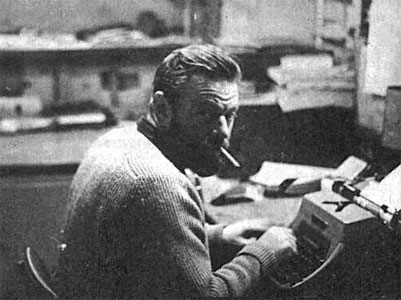
'Paul Kay (with Russian blood) speaks many languages and every day spends many hours close to the radio, gathering Big L news from all over the world.'
WEBMASTER:
We are extremely grateful to Tom for his translation. (This is Tom's own website, from which we have 'borrowed' the photo at the top of the page)
The facilities and technical equipment aboard the Galaxy clearly did not not live up to Willem de Ridder's expectations, although he seems fascinated by the cart machines. It's extremely interesting to learn that Hitweek's readers had become bored with listening to Veronica and switched to Big L. By the time of the visit, however, there appeared to be a new sense of disillusionment with the latter, which was now perceived to be 'going downhill'. Willem presumably gleaned this listener feedback from the contents of Hitweek's mailbag. Our biggest surprise was to see Paul Kaye described as Russian, which was not a description usually found on his CV! We imagine that his 'spending hours collecting news from around the world' was the official story given to the ship's visitors. The management would not have wanted it reported that the news was stolen from the BBC!
Link to the first page of original feature; Link to the rest of original feature, from the International Advertising and Design Database. |
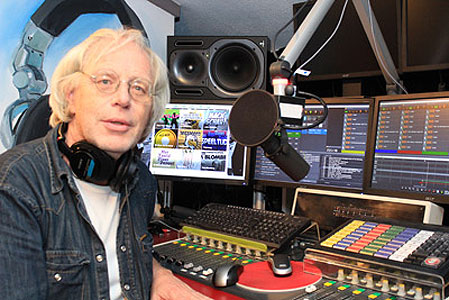
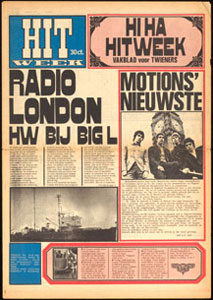
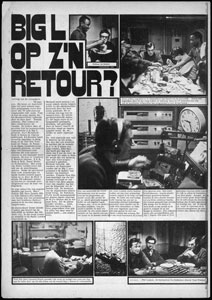
 RADIO LONDON
RADIO LONDON 
 Hitweek mentions that Dutch insiders think that the quality of the Big L programmes is diminishing, lately. According to Paul Kay (a bearded Russian, who is responsible for the news and who also took the pictures on this page for us) this is due to the music in the charts in recent months. The quality of record releases is on the decline. The compilation of the Fabulous Forty is based upon the recent releases that the DJs consider hit-bound. If the records disappoint... well, there you have it.
Hitweek mentions that Dutch insiders think that the quality of the Big L programmes is diminishing, lately. According to Paul Kay (a bearded Russian, who is responsible for the news and who also took the pictures on this page for us) this is due to the music in the charts in recent months. The quality of record releases is on the decline. The compilation of the Fabulous Forty is based upon the recent releases that the DJs consider hit-bound. If the records disappoint... well, there you have it.